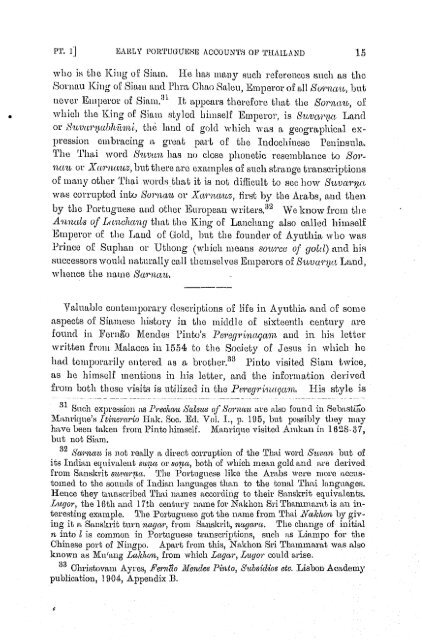The Journal of the Siam Society Vol. XXXII, 1940 - Khamkoo
The Journal of the Siam Society Vol. XXXII, 1940 - Khamkoo
The Journal of the Siam Society Vol. XXXII, 1940 - Khamkoo
You also want an ePaper? Increase the reach of your titles
YUMPU automatically turns print PDFs into web optimized ePapers that Google loves.
PT. 1] EAHL\' POR'l'UGUE.SE ACCOUN'l'S OF 'l'HAILAND 15<br />
•<br />
who is <strong>the</strong> King or Simn. Helms mnny such references such as tho<br />
Somau King <strong>of</strong> Simn 11nd Phnt Chao Salou, Emperor <strong>of</strong> all Sm'natt, but<br />
never Emperor <strong>of</strong> SiarnY 1 It appears <strong>the</strong>refore that <strong>the</strong> Sornw1-v, <strong>of</strong><br />
which <strong>the</strong> King o£ <strong>Siam</strong> styled himself Emperor, is S1.war~w. Land<br />
or >.'·hwlt?'1,Uthhfumt, <strong>the</strong> l1L11d <strong>of</strong> gold which was a geographical expl'ession<br />
em bracing tt gre::tt part <strong>of</strong> tho Indochinese Peninsuh.<br />
'l'he 'l'lw.i word S'nvan has no close phonetic resemblnnce to So?'<br />
natv or Xn?''IUL1LZ, but <strong>the</strong>re nrc examples <strong>of</strong> such strange transcriptions<br />
<strong>of</strong> many o<strong>the</strong>r Thai words that it 1s not difficult to see how Stwa?·~u~<br />
was corrupted into Surnau m· Xm·natvz, first by <strong>the</strong> Arabs, and <strong>the</strong>n<br />
by <strong>the</strong> Portuguese nucl o<strong>the</strong>r Europen,n writers.'l 2 We know from <strong>the</strong><br />
Anntvls <strong>of</strong> Lwnchctn,r; that <strong>the</strong> King <strong>of</strong> Lanehang also called himself<br />
Emperor <strong>of</strong> <strong>the</strong> Land <strong>of</strong> Gold, but <strong>the</strong> founder o£ Ayuthia who was<br />
Prince <strong>of</strong> Snphan ot• Uthong (>dlich means SO'Lv?'ce <strong>of</strong> go~cl) and hiR<br />
:mccessors would mtt.umlly call <strong>the</strong>mselves Emperors <strong>of</strong> SuvurJ,ut Land,<br />
whence <strong>the</strong> name ScG?'ncGu.<br />
V1Llnn1Jle euutempomry dcRcriptions <strong>of</strong> life in Ayuthia and <strong>of</strong> some<br />
aspects <strong>of</strong> Simnese hil:ltory in tho middle <strong>of</strong> Hixtoentb centmy are<br />
found in FeruO:o 1.\:lemles Pinto's Pm·eg?"inaga.m and in his letter<br />
written frolll M1Llacca in 1554 to <strong>the</strong> <strong>Society</strong> <strong>of</strong> Jesus in which he<br />
had temporarily entered 11s a brotber.'l 3 Pinto visited <strong>Siam</strong> twice,<br />
as he himself mentions in his lettet', and <strong>the</strong> infonnu.tion dm·i vecl<br />
from both <strong>the</strong>se visit.'! is utilized in <strong>the</strong> Poregri1w9a1n. His style is<br />
111<br />
Such expt·ession as Prechau Bc6leus <strong>of</strong> i:im'lUHt :Ll'e also found in Sebnstiito<br />
Ma.nriqne':,; Itinem1·io H:tk. Soc. Eel. <strong>Vol</strong>. I., p. lll5, but possibly <strong>the</strong>y may<br />
h:we been t;:tken from Pinto himself. M:1mique visited Amlmn in 1628-37,<br />
but; not <strong>Siam</strong>.<br />
32 &wna~• is not really 11 direct corruption <strong>of</strong> <strong>the</strong> ~Chai word s~wnn but <strong>of</strong><br />
its Indi:tn eqniv:tleut su~u~ or so~w, both <strong>of</strong> which mean gold and are derived<br />
from Smu;krit s~~vcw~w. 'rhe Pol'tugne8e like <strong>the</strong> Arn.bs wet·e more accustomed<br />
to <strong>the</strong> sounds <strong>of</strong> Indi:tn bngua.ges thn.n to <strong>the</strong> tomtl Tlmi languages.<br />
Hence <strong>the</strong>y tmm;cribed Thai names according to <strong>the</strong>ir Sanskrit equivalents.<br />
Lugm·, t;he 16th and 17t;h century n:tme for Nrtkhon Sl'i 'rhamnuwat is an interesting<br />
ex:tmple. 'l'he Portuguese got <strong>the</strong> name from ~rhai Nakhon by giving<br />
it n Sttnskrit turll1W{]cw, from Sanskrit, nngcwa. <strong>The</strong> chrmge <strong>of</strong> initi:tl<br />
n into l is common in Portuguese transcriptions, such as Liampo for <strong>the</strong><br />
Chinese port <strong>of</strong> Ningpo. Apart from thi:;, Nakhon Sri Th:tmmn.mt was also<br />
known a:; Mu 1 :tng Lalclton, from which Lctgcw, Lugo1· could arise,<br />
33 Ohristovam Ayres, li'e1·nao Jl[endes Pi1tto, S~tbsiclios etc. Lisbon Aettdemy<br />
publication, 1904, Appendix B.

















